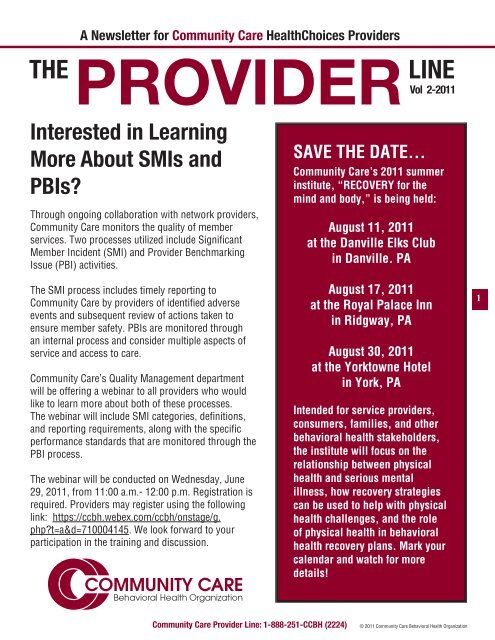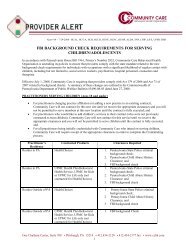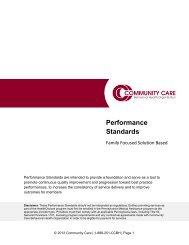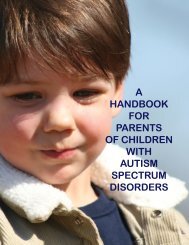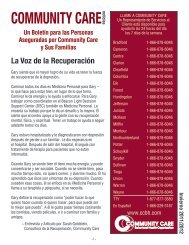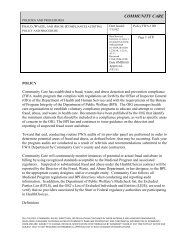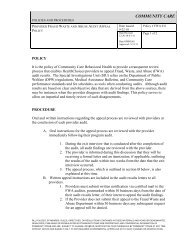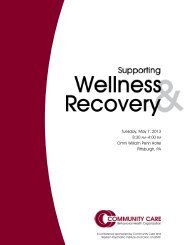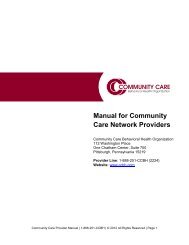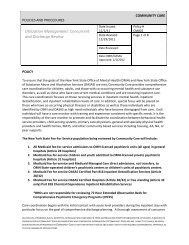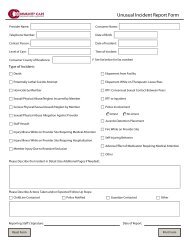Provider Newsletter April 2011 - Community Care Behavioral Health
Provider Newsletter April 2011 - Community Care Behavioral Health
Provider Newsletter April 2011 - Community Care Behavioral Health
You also want an ePaper? Increase the reach of your titles
YUMPU automatically turns print PDFs into web optimized ePapers that Google loves.
THE<br />
A <strong>Newsletter</strong> for <strong>Community</strong> <strong>Care</strong> <strong>Health</strong>Choices <strong>Provider</strong>s<br />
PROVIDER<br />
LINE<br />
Vol 2-<strong>2011</strong><br />
Interested in Learning<br />
More About SMIs and<br />
PBIs<br />
Through ongoing collaboration with network providers,<br />
<strong>Community</strong> <strong>Care</strong> monitors the quality of member<br />
services. Two processes utilized include Significant<br />
Member Incident (SMI) and <strong>Provider</strong> Benchmarking<br />
Issue (PBI) activities.<br />
The SMI process includes timely reporting to<br />
<strong>Community</strong> <strong>Care</strong> by providers of identified adverse<br />
events and subsequent review of actions taken to<br />
ensure member safety. PBIs are monitored through<br />
an internal process and consider multiple aspects of<br />
service and access to care.<br />
<strong>Community</strong> <strong>Care</strong>’s Quality Management department<br />
will be offering a webinar to all providers who would<br />
like to learn more about both of these processes.<br />
The webinar will include SMI categories, definitions,<br />
and reporting requirements, along with the specific<br />
performance standards that are monitored through the<br />
PBI process.<br />
The webinar will be conducted on Wednesday, June<br />
29, <strong>2011</strong>, from 11:00 a.m.- 12:00 p.m. Registration is<br />
required. <strong>Provider</strong>s may register using the following<br />
link: https://ccbh.webex.com/ccbh/onstage/g.<br />
phpt=a&d=710004145. We look forward to your<br />
participation in the training and discussion.<br />
SAVE THE DATE...<br />
<strong>Community</strong> <strong>Care</strong>’s <strong>2011</strong> summer<br />
institute, “RECOVERY for the<br />
mind and body,” is being held:<br />
August 11, <strong>2011</strong><br />
at the Danville Elks Club<br />
in Danville. PA<br />
August 17, <strong>2011</strong><br />
at the Royal Palace Inn<br />
in Ridgway, PA<br />
August 30, <strong>2011</strong><br />
at the Yorktowne Hotel<br />
in York, PA<br />
Intended for service providers,<br />
consumers, families, and other<br />
behavioral health stakeholders,<br />
the institute will focus on the<br />
relationship between physical<br />
health and serious mental<br />
illness, how recovery strategies<br />
can be used to help with physical<br />
health challenges, and the role<br />
of physical health in behavioral<br />
health recovery plans. Mark your<br />
calendar and watch for more<br />
details!<br />
1<br />
<strong>Community</strong> <strong>Care</strong> <strong>Provider</strong> Line: 1-888-251-CCBH (2224)<br />
© <strong>2011</strong> <strong>Community</strong> <strong>Care</strong> <strong>Behavioral</strong> <strong>Health</strong> Organization
2<br />
Substance Use<br />
Disorders Among Older<br />
Adults-A Growing Issue<br />
In 2009, it was estimated that 2.8 million people in<br />
the United States age 50 and older had a substance<br />
use disorder. By 2020, this number is expected to<br />
double.<br />
Older adults who abuse drugs or alcohol are<br />
at greater risk for physical and mental health<br />
complications, including drug-medication<br />
interactions, delirium, memory loss, falls, and<br />
fractures. This group also is at greater risk for<br />
hospitalization, nursing home placement, and<br />
serious health problems, including death.<br />
Older adults often experience addiction to drugs<br />
and alcohol differently than younger age groups.<br />
Some adults enter late age with a lifetime history of<br />
drug and alcohol abuse. Others develop problems<br />
in combination with the physical, cognitive and<br />
behavioral issues more likely to be present in<br />
older adults. For example, as their bodies change,<br />
older adults are less able to metabolize alcohol.<br />
Also, they are commonly prescribed drugs with<br />
abuse potential, such as sleeping medications<br />
and narcotic pain killers. Depression, anxiety and<br />
cognitive effects of aging such as confusion and<br />
forgetfulness may also play a role. Other social<br />
factors common to older adults, including isolation,<br />
loss, changing roles, and economic hardship can<br />
also contribute to the development of substance<br />
use problems. The good news is that certain<br />
factors, such as supportive family and social bonds,<br />
access to resources, involvement in the community<br />
and ability to live independently, can protect against<br />
the development of a substance use disorder in<br />
older adults.<br />
In addition, an estimated 50% of older adults with<br />
substance use disorders also have a co-occurring<br />
mental illness, such as depression and anxiety.<br />
Substance use disorders are also considered<br />
chronic conditions, requiring intensive and<br />
sometimes long-term support. Although there is<br />
no cure, addiction can be managed with proper<br />
treatment and persons can recover.<br />
Identification and treatment of substance use<br />
disorders in this population can be a challenge.<br />
Older persons may be reluctant to ask for help<br />
with issues of substance use disorders because<br />
of feelings of shame or denial. Families may<br />
also be unaware of the problem or find the use<br />
socially acceptable. Clinicians may have difficulty<br />
diagnosing substance use disorders in older<br />
adults because the symptoms often look like other<br />
disorders, such as dementia or depression. Some<br />
clinicians find it difficult to address the problem<br />
with their older clients or may also ignore the<br />
problem believing it’s not worth treating substance<br />
abuse in older adults.<br />
It is important for older adults to talk to with their<br />
health care providers about these issues. Treatment<br />
approaches for substance use disorders that take<br />
into account the physical, social, and cognitive<br />
effects of aging are best. The PA Client Placement<br />
Criteria for Adults (PCPC) are guidelines designed<br />
to provide clinicians with a basis for determining the<br />
most appropriate level of care for persons with drug<br />
and alcohol problems. Levels of care available range<br />
from medically managed inpatient programs and<br />
residential programs, to outpatient programs.<br />
To learn more, contact <strong>Community</strong> <strong>Care</strong> or visit:<br />
• SAMSHA (Substance Abuse and Mental <strong>Health</strong><br />
Service Administration): www.samhsa.gov<br />
• IRETA (Institute for Research, Education and<br />
Training in Addictions): www.ireta.org<br />
• National Institute on Aging: www.nia.nih.gov<br />
<strong>Community</strong> <strong>Care</strong> <strong>Provider</strong> Line: 1-888-251-CCBH (2224)
Always Online<br />
We would like to remind you about our website,<br />
www.ccbh.com. We include information about<br />
many topics of interest here. You can view and/or<br />
download information about the following topics<br />
on our website by clicking on <strong>Provider</strong> Resources,<br />
<strong>Health</strong>Choices Resources, and then Informational<br />
Articles.<br />
• Information about our Quality Improvement<br />
Program including goals, processes, and<br />
outcomes related to care and service.<br />
• Our efforts to measure the accessibility of care<br />
and service for members, such as how long it<br />
takes to get an appointment, and actions taken<br />
to improve accessibility.<br />
• The clinical practice guidelines and processes<br />
utilized to measure adherence to the guidelines.<br />
• Our expectations for exchange of information<br />
with PCPs and within the behavioral health<br />
continuum to facilitate continuity and<br />
coordination of care.<br />
• Our Medical Necessity Criteria, including how to<br />
obtain or view a copy.<br />
• The toll-free number to contact staff regarding<br />
utilization management issues, or if you have a<br />
utilization management question.<br />
• The availability of, and process for, contacting<br />
an appropriate professional advisor to discuss<br />
utilization management decisions.<br />
• A description of the availability of an<br />
independent external appeals process for<br />
utilization management decisions made by<br />
<strong>Community</strong> <strong>Care</strong>.<br />
• Our policy prohibiting financial incentives for<br />
utilization management decision-makers.<br />
• Members’ rights and responsibilities.<br />
• Our confidentiality policies including: what a<br />
“routine consent” is and how it allows us to<br />
use information about enrollees; a member’s<br />
right to approve release of personal health<br />
<strong>Community</strong> <strong>Care</strong> <strong>Provider</strong> Line: 1-888-251-CCBH (2224)<br />
w w w.ccbh.com<br />
information not<br />
covered by “routine<br />
consent;” how members<br />
may request restriction<br />
on the use or disclosure of<br />
personal health information,<br />
amendments to personal<br />
health information, access to personal health<br />
information or an accounting of disclosures of<br />
personal health information; our commitment<br />
to protect the member’s privacy in all settings;<br />
and our policy on sharing personal health<br />
information with employers.<br />
• Information about our preventive behavioral<br />
health programs including how successful these<br />
programs have been.<br />
• For our treatment record policies regarding<br />
confidentiality of treatment records,<br />
documentation standards, systems for<br />
organization of treatment records, standards for<br />
availability of treatment records at the practice<br />
site and performance goals, please see your<br />
<strong>Provider</strong> Manual, which can also be found at<br />
www.ccbh.com.<br />
• For a description of the process to review<br />
information submitted to support your<br />
credentialing application, correct erroneous<br />
information and upon request to be informed<br />
of the status of your credentialing and<br />
recredentialing application, please see your<br />
<strong>Provider</strong> Manual, which can also be found at<br />
www.ccbh.com.<br />
If you have questions about accessing our website<br />
or would like more information or paper copies of<br />
any of the above items, call 1-888-251-2224.<br />
Please call <strong>Community</strong> <strong>Care</strong>’s<br />
<strong>Provider</strong> Line toll-free<br />
at 1-888-251-2224<br />
to report all adverse events.<br />
3
4<br />
Pharmacy News<br />
Antipsychotic utilization trend<br />
for children in <strong>Health</strong>Choices<br />
Allegheny County<br />
There are significant concerns regarding the use<br />
of antipsychotics in children and adolescents.<br />
Antipsychotics are often prescribed in this<br />
population to treat nonpsychotic disorders<br />
and for off-label indications. Studies have<br />
indicated that children and adolescents when<br />
compared to adults, have higher rates of some<br />
antipsychotic-induced adverse effects. These<br />
include sedation, extrapyramidal side effects,<br />
withdrawal dyskinesia, prolactin elevation,<br />
weight gain, and some metabolic abnormalities.<br />
The article, Cardiometabolic Risk of Second-<br />
Generation Antipsychotic Medications During<br />
First-Time Use in Children and Adolescents,<br />
reported substantive weight gain during a 12 week<br />
trial of Abilify, Zyprexa, Seroquel or Risperdal<br />
in children who had not previously received an<br />
atypical antipsychotic. Weight gain, ranging from<br />
an average of 10 pounds with Abilify to an average<br />
of 19 pounds with Zyprexa was noted for all 4<br />
antipsychotic medications. Considerable increases<br />
in glucose, cholesterol and triglyceride levels were<br />
also observed during the 12 week trial. 1 There are<br />
concerns that these adverse effects may cause<br />
long-term health consequences.<br />
Prior authorization policies regarding<br />
antipsychotic use in children have been put into<br />
place by DPW and physical health plans to help<br />
address the above concerns. UPMC for You is<br />
the only health plan in Allegheny County to have<br />
an antipsychotic prior authorization policy that<br />
includes children between the ages of 6 and<br />
11. Antipsychotic prior authorization policies<br />
regarding use in children currently in place by<br />
other Medicaid physical health plans in Allegheny<br />
County are for children less than 5 years of age or<br />
for children less than 6 years of age.<br />
<strong>Community</strong> <strong>Care</strong> conducted trend analyses to<br />
determine if UPMC’s prior authorization policy<br />
on antipsychotic use in children has decreased<br />
antipsychotic utilization in this population.<br />
Antipsychotic utilization of all <strong>Health</strong>Choices<br />
members aged 0-11 in Allegheny County was<br />
compared to the antipsychotic utilization of UPMC<br />
for You members in Allegheny County aged 0-11<br />
each month from January 2009-October 2010. The<br />
results show a significant decrease in utilization for<br />
UPMC for You child members in Allegheny County<br />
compared to the Allegheny County <strong>Health</strong>Choices<br />
aggregate. These results will be reviewed with<br />
all Allegheny County Medicaid health plans and<br />
other stakeholders since this off-label use of<br />
antipsychotics in children has been identified as a<br />
potential quality of care concern.<br />
1. Correll CU, Manu P, Olshanskiy V, et al. Cardiometabolic risk of<br />
second-generation antipsychotic medications during first-time use<br />
in children and adolescents. JAMA. 2009;302(16):1765-1773.<br />
Study finds off-label prescribing<br />
of antipsychotics increasing<br />
A recent study published online in<br />
Pharmacoepidemiology and Drug Safety identified<br />
that many prescriptions written for atypical<br />
antipsychotics are given for off-label use in the<br />
absence of strong evidence.<br />
Researchers at the Stanford University School<br />
of Medicine and University of Chicago analyzed<br />
the results of a physicians’ survey, the IMS<br />
<strong>Health</strong> National Disease and Therapeutic Index<br />
survey. The survey looks at conditions treated by<br />
the participating physicians and the drugs they<br />
prescribe. Researchers identified antipsychotic<br />
(continued on page 5)<br />
<strong>Community</strong> <strong>Care</strong> <strong>Provider</strong> Line: 1-888-251-CCBH (2224)
(continued from page 4)<br />
drugs prescribed by these physicians and the<br />
reasons for their use. Efficacy ratings from the drug<br />
compendium Drugdex were then used to assess<br />
the strength of the evidence supporting those<br />
antipsychotics prescribed for non-FDA approved<br />
indications.<br />
The researchers found that antipsychotic treatment<br />
prescribed during the surveyed doctors’ visits<br />
almost tripled from 6.2 million in 1995 to 16.7<br />
million 2008. Antipsychotic use for indications that<br />
lacked FDA approval increased from 4.4 million<br />
prescriptions during surveyed doctors’ visits in<br />
1995 to 9 million in 2008. Fifty-four percent of the<br />
surveyed prescriptions for atypical antipsychotics<br />
in 2008 had uncertain evidence. It is estimated<br />
that $6 billion was spent in 2008 on off-label use<br />
of antipsychotic medications nationwide, of which<br />
$5.4 billion was for uses with uncertain evidence. 2<br />
In 2006, prescriptions for antipsychotics started<br />
to decrease slightly after the FDA issued warnings<br />
about their safety.<br />
The results of this study add to the concerns facing<br />
this particular class of drugs, which have been<br />
the focus of thousands of lawsuits. Every major<br />
pharmaceutical company marketing an atypical<br />
antipsychotic medication has either settled a lawsuit<br />
or is currently under investigation for skewing study<br />
results or for practices relating to the promotion of<br />
the drugs for off-label uses. Atypical antipsychotics<br />
as a class make up the single largest target of<br />
litigation filed under the federal False Claims Act.<br />
To learn more about the study or about lawsuits<br />
involving atypical antipsychotics visit http://<br />
onlinelibrary.wiley.com/doi/10.1002/pds.2082/<br />
pdf and http://www.nytimes.com/2010/10/03/<br />
business/03psych.html.<br />
2. Alexander GC, Gallagher SA, Mascola A et al. Increasing<br />
off-label use of antipsychotic medications in the United States,<br />
1995-2008. Pharmacoepidemiol. Drug Saf. <strong>2011</strong>;20:177-184.<br />
Assessment of metabolic<br />
monitoring for consumers on<br />
antipsychotic medications<br />
<strong>Community</strong> <strong>Care</strong> collaborated with several of<br />
the Pennsylvania <strong>Health</strong>Choices physical health<br />
managed care plans to determine the rate of<br />
metabolic monitoring for members taking<br />
antipsychotic medications. <strong>Community</strong> <strong>Care</strong><br />
identified members who were prescribed an<br />
antipsychotic medication from December 1, 2008<br />
through March 31, 2009. The physical health<br />
plans then provided laboratory claims data for<br />
the identified members. The data consisted of<br />
glucose and lipid claims with service dates between<br />
September 1, 2008 and March 31, 2010. The<br />
overall rate of annual lab monitoring increased from<br />
51% in 2008 to 69% in 2010.<br />
<strong>Community</strong> <strong>Care</strong> assessed when laboratory<br />
evaluations were being conducted in relation to the<br />
antipsychotic fill date to determine if the American<br />
Psychiatric Association’s recommended guidelines<br />
were being followed. These guidelines recommend<br />
baseline evaluations of serum lipid and glucose,<br />
evaluation of serum glucose after 90 days, and<br />
then annual reassessment of serum glucose. Of the<br />
members who were prescribed an antipsychotic<br />
medication during the above time period, 1896<br />
were identified as newly starting an antipsychotic<br />
medication. <strong>Community</strong> <strong>Care</strong> determined that<br />
only 229 of these members had baseline glucose<br />
and lipid levels done within three to six months of<br />
their first antipsychotic prescription fill. Of the 229<br />
members, only 49 had their glucose and lipid levels<br />
repeated within the next four months.<br />
Informational letters discussing the importance<br />
of metabolic monitoring for those prescribed<br />
antipsychotic medications will be sent to providers<br />
and to the parents/guardians of members.<br />
5<br />
<strong>Community</strong> <strong>Care</strong> <strong>Provider</strong> Line: 1-888-251-CCBH (2224)
6<br />
Safety Update: Use of<br />
Antipsychotics During<br />
Pregnancy<br />
The US Food and Drug Administration<br />
has updated the Pregnancy section<br />
of drug labels for the entire class<br />
of antipsychotic drugs. The drug<br />
labels will describe in more detail<br />
and consistency the potential risk<br />
for abnormal muscle movements<br />
(extrapyramidal signs or EPS) and<br />
withdrawal symptoms in newborns<br />
whose mothers have been treated with<br />
antipsychotic medications during the<br />
third trimester of pregnancy.<br />
A search of the FDA’s Adverse Event<br />
Reporting system data base through<br />
October 29, 2008 identified 69 cases<br />
of neonatal EPS or withdrawal with<br />
all antipsychotic drugs. A majority<br />
of the cases were confounded by<br />
other factors but there were some<br />
cases which suggest that neonatal<br />
EPS and withdrawal may occur with<br />
antipsychotics alone.<br />
The FDA is advising clinicians to<br />
monitor neonates displaying EPS or<br />
withdrawal symptoms, noting that<br />
while some recover within hours or<br />
days, other may require prolonged<br />
hospitalization.<br />
Quality Improvement<br />
High-quality care is a priority for <strong>Community</strong> <strong>Care</strong>. Our quality<br />
improvement program is designed with input from network<br />
practitioners and follows the guidelines of the National<br />
Committee for Quality Assurance (NCQA).<br />
Areas of focus include:<br />
• Delivering high value, culturally competent care that<br />
incorporates the special needs and preferences of members.<br />
• Continuously improving the clinical care and service provided<br />
to members.<br />
• Enhancing the community’s health status through wellness<br />
and preventive behavioral health programs for members.<br />
• Pursuing opportunities to improve the health status of<br />
members and targeting efforts to the needs of the population.<br />
• Ensuring that care and services are available and provided to<br />
members in a timely manner that is appropriate to the needs<br />
and preferences of members.<br />
• Ensuring that care and services are coordinated between<br />
providers and across all delivery settings through the care<br />
management process.<br />
• Establishing collegial relationships with providers to achieve<br />
superior clinical and customer service outcomes.<br />
• Providing exceptional customer service.<br />
• Continuously improving quality improvement processes by<br />
maintaining comprehensive, current, and effective quality<br />
management policies and procedures.<br />
• Analyzing performance data and identifying opportunities to<br />
improve performance and outcomes.<br />
For more information regarding our quality improvement<br />
program call 1-888-251-2224. We will provide you with a<br />
program description and an update on progress toward meeting<br />
our goals.<br />
For the complete MedWatch Safety<br />
Summary along with information for<br />
health care professionals, please refer<br />
to the FDA website at http://www.fda.<br />
gov/Drugs/DrugSafety/ucm243903.<br />
htm.<br />
Send suggestions for improving our quality improvement<br />
program to:<br />
<strong>Community</strong> <strong>Care</strong> <strong>Behavioral</strong> <strong>Health</strong> Organization<br />
Quality Management<br />
One Chatham Center, Suite 700<br />
112 Washington Place<br />
Pittsburgh, PA 15219<br />
<strong>Community</strong> <strong>Care</strong> <strong>Provider</strong> Line: 1-888-251-CCBH (2224)
<strong>Care</strong> Coordination<br />
Individuals with behavioral health disorders are often at<br />
greater risk of developing physical illnesses. Therefore,<br />
behavioral health specialists and medical practitioners should<br />
coordinate care to promote overall better health for patients.<br />
Some facts to consider regarding the physical/behavioral<br />
health connection:<br />
• Treating depression can help improve the prognosis<br />
of a co-occurring medical illness.<br />
• People who have untreated mental health issues use<br />
more general medical services.<br />
• People who have depression are more likely than others<br />
to develop diabetes.<br />
• Anxiety disorders are linked with many physical health<br />
illnesses, including epilepsy, cardiac disease, asthma,<br />
and diabetes.<br />
Some medications used to treat behavioral health disorders<br />
also have an effect on physical health and require more<br />
intensive monitoring. For instance, some antipsychotics can<br />
affect blood glucose and lipids, and some antidepressants<br />
can cause weight gain. Patients taking these medications may<br />
need to see their physical health practitioners more often.<br />
<strong>Community</strong> <strong>Care</strong> strongly encourages you to coordinate care<br />
with all other practitioners who are seeing the same patient.<br />
Coordination decreases duplicating assessments, procedures,<br />
and tests, while promoting patient safety and improving<br />
treatment outcomes.<br />
Web-based <strong>Provider</strong> Trainings<br />
Access Standards<br />
<strong>Community</strong> <strong>Care</strong> providers are<br />
contractually obligated to provide<br />
access to appointments for members<br />
that meet <strong>Health</strong>Choices program<br />
requirements.<br />
<strong>Community</strong> <strong>Care</strong> members are<br />
entitled to:<br />
• Services for routine behavioral<br />
health needs within seven calendar<br />
days.<br />
• Services for urgent needs within<br />
24 hours.<br />
• Non-life-threatening emergency<br />
services within one hour.<br />
• Immediate emergency services in<br />
life-threatening situations.<br />
If you are unable to meet these<br />
standards, notify your <strong>Provider</strong><br />
Representative as soon as possible.<br />
7<br />
<strong>Community</strong> <strong>Care</strong> has developed a series of<br />
informative, web-based trainings on several levels<br />
of care to familiarize providers with those services<br />
and the expectations of <strong>Community</strong> <strong>Care</strong>’s Quality,<br />
<strong>Care</strong> Management, Network, Fraud and Abuse, and<br />
Complaint and Grievance departments regarding<br />
those services. The trainings are posted on our<br />
website, www.ccbh.com, under <strong>Provider</strong> Resources.<br />
<strong>Community</strong> <strong>Care</strong> <strong>Provider</strong> Line: 1-888-251-CCBH (2224)
8<br />
Dating Abuse: How<br />
to Talk to Your Teen<br />
~ From the PA Department of Public Welfare<br />
It’s never too soon to talk to your teen about dating<br />
abuse. Know the facts and risks about teen dating<br />
abuse. Abuse can be physical, sexual, or emotional.<br />
It includes deliberately hurting feelings, namecalling,<br />
or controlling money.<br />
Life presents many chances to discuss abuse with<br />
your teen. You can:<br />
• Talk about events from TV, movies, or real life.<br />
• Ask your teen what a positive relationship looks<br />
like.<br />
• Ask your teen what an abusive relationship looks<br />
like.<br />
• Ask your teen if she knows anyone who is being<br />
abused and, if she does, talk about ways to help.<br />
• Remind your teen that dating should be fun!<br />
If you find your teen is being abused, you can:<br />
• Map out ways to stay safe.<br />
• Discuss options with your teen. Your local<br />
domestic abuse program can help.<br />
• Remind your teen of the right to say NO, even<br />
after she or he has said yes.<br />
• Let your teen know she can always come to you<br />
for help.<br />
Don’t judge your teen or push her to talk, as she<br />
may stop talking about the abuse. Don’t blame your<br />
teen for being abused. Remain calm and supportive<br />
of your teen’s response. Your teen may just be<br />
trying to understand dating and respect. If your<br />
teen is in immediate danger, call the police and<br />
your local domestic violence program for support.<br />
Remember, dating abuse also happens online and<br />
through texting.<br />
Teens who need help can call the<br />
National Teen Dating Abuse Helpline<br />
at 1-866-331-9474 or<br />
1-866-331-8453 (TTY for the Deaf).<br />
To learn the facts and risks<br />
about teen dating abuse, go to<br />
http://www.loveisrespect.org,<br />
http://www.breakthecycle.org, or<br />
http://www.loveisnotabuse.com/web/guest/home.<br />
To speak with someone about abuse or locate<br />
a local domestic violence program, call the<br />
National Domestic Violence Hotline<br />
at 1-800-799-7233 (SAFE) or<br />
1-800-787-3224 (TTY for the Deaf).<br />
Visit http://www.thehotline.org<br />
for more information.<br />
<strong>Community</strong> <strong>Care</strong> <strong>Provider</strong> Line: 1-888-251-CCBH (2224)<br />
0415<strong>2011</strong>MA


